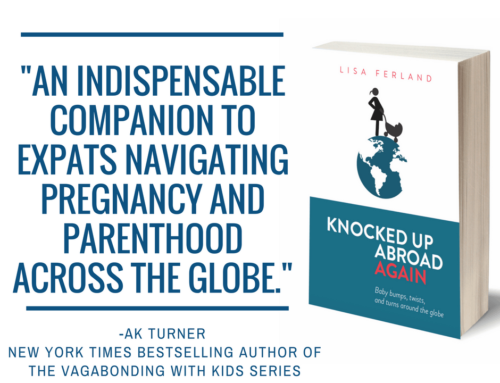About a month ago, I was invited to be interviewed for a podcast with Marianna Du Bosq at Bilingual Avenue. She asked me to talk about raising my daughter bilingual in Portuguese and English, with English being the minority language. (Jargon alert! In the bilingual community, minority language is any language not spoken by the majority of people in the community.) I was flattered and excited. In preparation, I visited her site and pulled up previous podcasts. As I listened to the PhD experts and trilingual parents, the researchers and published authors, I began to suspect that I would be the least helpful person ever interviewed for Bilingual Avenue.
Well the interview is up, and I’m certain that I’m the least helpful guest ever.
Of all the issues that come with parenting my daughter, raising her bilingual is one of the last I think about. In terms of energy usage, reflecting on her bilingualism comes just after flossing her teeth and ahead of which hand she writes with.
I don’t have a favorite book on bilingualism. I don’t have tips or special strategies to share. I can’t list the names of prominent researchers in the field or site the latest journal article making waves. I don’t have a “biggest fear” or “primary concern”. I’m not visiting online forums and sharing my struggles with other parents.
Before my daughter was born I did buy two books on raising bilingual kids. I read enough to know the common strategies: One Parent One Language (each parent speaks his/her native language to the child) and Minority Language at Home (the child learns the majority language at school/in public and speaks the minority language with both parents at home). Our pre-birth strategy session went something like this:
Me: “Since she’s going to be getting Portuguese at school and with all her friends, we should probably speak English to her at home, right?”
My Husband: “Absolutely.”
And that was that. Marianna asked me during the interview how my Brazilian husband feels about speaking English to his daughter. Not to spoil the interview, but I considered revealing my suspicions that I married a robot. He speaks English fluently and wants his daughter to be fluent in both languages, thus the logical choice was to speak English at home. Period. I realize this story is not helpful for the majority of people who also consider feelings when making decisions. I personally would not be able to say “I love you” in Portuguese and feel it the way I do in English, but my husband didn’t give it a second thought.
It’s possible we would have talked about it more, but then my daughter was born seven weeks early. We spent a month in the NICU. She developed a severe food allergy that caused bloody stools until she was 8 months and left me, the breastfeeding mom, only able to eat fruits and vegetables handpicked by fairies and meat that hadn’t been cooked in anything remotely tasty. Her breastfeeding feeding schedule was every two hours, so I didn’t sleep for almost a year. She has severe separation anxiety which has allowed me one night off in over four years, and that night was such a disaster it will take years for everyone to recover enough to try again. When she started throwing tantrums, they included biting, scratching, spitting, kicking, and screaming until she lost her voice. Two years later, we’ve managed to reduce the tantrums to only screaming and throwing toys at doors instead of people. She refuses to try new foods. Iran is more flexible over nuclear policies than my daughter is on the subject of vegetables. And she has recently decided she is done with both school and sleeping.
Truly my daughter speaking two languages is the least of my concerns.
Her teachers report no problems with communication. She has lots of friends she speaks to in Portuguese. She enjoys speaking in English to my parents via Skype. She might have in total fewer words in English than a monolingual her age but so, what? I’m a native English speaker and still regularly have to look up English words I’ve never seen before. With every piece of writing, I learn new ways to use and manipulate my native language. Learning a language is a lifelong activity, not something you need mastered by 18. My kid can identify an armadillo in both English and Portuguese. I’m not worried.
When I do consider her bilingualism and her place in the world as a bilingual, I remember that the idea a child should only have one native language or risk never being fluent in any has been totally and completely debunked. Linguists estimate 75% of the world’s population speaks more than one language and about 20% of the U.S. population. She’s far from alone in her bilingualism. In fact, compared to the many families passing on three or even four languages, our two-language family is pretty straightforward.
I think about these facts for two minutes and then go back to finding a way to make applying sunscreen less traumatic. Which is why, I’m the absolute last parent to ask about raising a bilingual child.
Because when someone says “You’re raising her bilingual. How’s that going?” I say, “Fine. Hey, do you have any suggestions for getting her to not hate carrots?”
*Here is the link to my interview with Marianna at Bilingual Avenue. Episode 87: Learning Language from our Kids with Brynn Barineau
If you have any questions or doubts about raising multilingual kids, Bilingual Avenue is a great resource!!









What a lovely read! A fun one and you have touch so many topics that I can relate to! My son speaks english but not my language as I thought before that we would alienate his Dad when we use my language. Now I wished I have started early as I know its important for him to know both language as he is from both countries. #pocolo
I don’t think it’s ever too late to start teaching your son. Bilingual Avenue, the site I mention in this post, just put up a podcast on just this topic. “Is it too late to teach my older children a second language?” http://www.bilingualavenue.com/episode90/
I admire your pragmatic approach. Sometimes the over-thinking of aspects of parenting needs to be called for what it is.
Good luck with the vegetables. I wish I could express that in several languages, but I can’t.
Thanks for well wishes! Absolutely no vegetable were consumed today other than black beans, which aren’t really a vegetable but I have to count them as one in order to have peace of mind. We’ll try again tomorrow.
I am with Tracey on the puree – it does work! I think that this is a really interesting post. I wish my daughter had started speaking another language at an early age. It sounds like it is second nature in your house. Welcome to #PoCoLo. Thank you so much for linking and hope to see you again next week.
I’m so glad I found #PoCoLo. I discovered a few awesome blogs because of it. I’ll definitely link up next week. And I’ll definitely be trying to sneak pureed carrots into my daughter’s spaghetti sauce.
Speaking two languages is so normal in our house that we don’t even think about it as being any kind of issue that we have to deal with!
Have you tried making carrot muffins? Or courgette and cocoa muffins? I hid vegetables in muffins for a long time 🙂
#pocolo
Vegetable in muffins. That’s a great plan! Unfortunately, it means I have to learn to bake. Hmmm.
Try pureeing the carrots adding a bit of tomato puree and using it as a tomato sauce.
Sorry I cant add much in the way of observations about raising a bilingual child, but its interesting to read about how you have adrressed the issue. #PoCoLo
Purees carrots in tomato sauce…I will have to try that. Any suggestions for broccoli? Peas? Beets? Green beans?
Such a good post and there’s SO much to say that bringing children up to be bilingual is actually a GOOD thing! Please ignore me if this isn’t in the least bit appropriate but I wonder if your daughter might have Sensory Processing Disorder? Here’s what I wrote about our youngest… there are links in it to other posts that may be useful too. http://internationalelfservice.co.uk/international-elf-service/sensory-processing-disorder-boy-syndrome/
Thanks for the concern! I have actually done some research on Sensory Processing Disorder but I don’t think my daughter fits most of the symptoms and those she does not consistently. She does throw terrible!!!! fits but they consistently happen when she’s overtired. She’s a picky eater but she’s not complaining about textures or flavors. (She won’t even open her mouth to try the new food.) No, I’ve just concluded she is extremely stubborn and strong-willed but nothing abnormal. Combine that with separation anxiety caused (I’m convinced) by a month in the NICU and it makes for some tough parenting. And overall, everything is improving. Still, I’m aware of the signs and I definitely am watching to see if any behaviors worsen or regress. Thanks for the resources!
Loved reading your post. I am in a similar situation, but I am the only one at home using the minority language as my partner doesn’t speak perfect Spanish. I just find it a natural process and a must for my children
#brilliantblgposts
Oh wow, I think it would be significantly harder if I were the only one speaking English. I’m glad it’s going so well for you. Yay bilingualism!
Haha, I’d be the same. We speak in our own first languages (English and Thai). And that’s about all I have to say about that 🙂
#brilliantblogposts
Yeah, there are just so many other things that are more difficult in our household than the bilingual thing. Like getting her to sleep in her own bed or not freak out at the idea of sharing…
We are raising our kids bilingual and it does feel really natural. I find a makeup brush helps with applying the sun screen, like painting it on.
Makeup brush! I’d never have thought of that. I’ll definitely have to try it. Thanks! ; )
It was very interesting to read your perspective on bilingualism. I’m raising my son as a bilingual. I don’t put a huge amount of effort into it. As much as any parent teaching their child their language: speaking a lot, reading a lot, repeating A LOT. My situation is different to yours. I am the only Polish speaking person for my son on daily basis (we Skype grandparents, but not as regularly as we should). We live in London and my husband is English, with virtually no knowledge of Polish. My son being bilingual is an important aspect for me. Maybe because he is a good eater and hasn’t reached the tantrum stage yet…
Well done for breastfeeding at such high personal cost!
#brilliantblogposts
That’s got to be tough, being the only speaker of the language you want your son to learn. I know that fact my husband is able and willing to make our home environment English-speaking (not strictly, of course) is a HUGE part of why I don’t need to stress about it. If I was doing all the English teaching on my own, it would be a very different story. Good luck to you!
So nice to read this! Well, nice to read the bilingualism part – I’m sorry you are having to deal with the separation anxiety and other issues. I keep reading these posts about bilingualism and multiculturalism and it all sounds so foreign to me. My girls are French/English bilingual through practically no effort on my part. My husband and I are Anglophone Canadians but we have lived in France since before our daughters were born. We only speak English at home but they attended the local French schools from age three to age 10/11. They now attend an international middle school where they follow the normal French curriculum but also have six hours a week in English with other natice English speakers.
That’s wonderful your daughters have adopted both languages so easily. My daughter’s only four so I’m happy to know things don’t necessarily get harder as kids get older and possibly more resistant to doing (or speaking) what their parents do. Not that any child has ever been contrary just for the sake of not doing what the parents want…oh wait, my kid already does that everyday. ; ) I’m so looking forward to her middle school years. Good luck with yours!
The last line was epic! I like this “no stress” bilingual children raising. It seems so natural to me.
Thanks Orana! And I’m kind of serious about the carrot thing. I really am open to suggestions. : )
Love the post! What a relief! Isn’t stress free the best way to keep it going? Your post made my day!
Thanks Amanda! Glad I could make you smile. Good luck to your multilingual family!
Hi Brynn,
I’m a friend of your Mom’s and I wanted to let you know how much I enjoy your blog. Keep writing!
Thank you so much for the encouragement Susan! I’m glad you enjoy the blog. I’ll keep the posts coming.
Awesome post. You should be the first person people go to for bilingual advice. My parents were super stressy about my bilingualism and it gave me a bit of a superiority complex as a kid. Can’t wait to hear the podcast!
Thanks Julie! I would probably be more anxious about my kid’s bilingualism is I didn’t have a thousand other issues with her. I think your parent’s focus on your bilingualism means you were a perfect child. ; )
Amen!!! Thank you for writing this.
There are way too many people out there who take this bilingualism thing way too far. We are multilingual families. But it does not define us. Life is more important. Relationships, character, interests are what define us.
A
I completely agree Annabelle! I know there are some families with more then two languages, frequent relocations, or other contexts that require prioritizing and planning around language learning, but that’s not my family’s experience. I think that the anxiety and stress of some specific multilingual families can color the entire discussion of bilingualism making it seem like this huge undertaking and monumental challenge. For my family it’s been a breeze and one of the least stressful aspects of parenting.